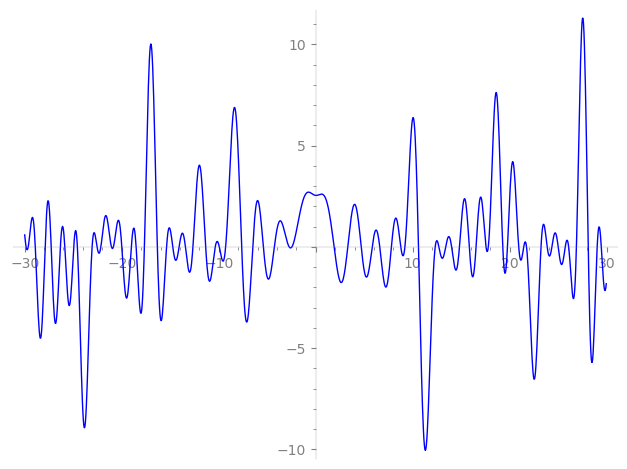| L(s) = 1 | + (1 − i)2-s + (1.41 + i)3-s − 2i·4-s + (2.41 + 2.41i)5-s + (2.41 − 0.414i)6-s − 7-s + (−2 − 2i)8-s + (1.00 + 2.82i)9-s + 4.82·10-s + (−1.82 + 1.82i)11-s + (2 − 2.82i)12-s + (−1.58 − 1.58i)13-s + (−1 + i)14-s + (1 + 5.82i)15-s − 4·16-s − 6.82i·17-s + ⋯ |
| L(s) = 1 | + (0.707 − 0.707i)2-s + (0.816 + 0.577i)3-s − i·4-s + (1.07 + 1.07i)5-s + (0.985 − 0.169i)6-s − 0.377·7-s + (−0.707 − 0.707i)8-s + (0.333 + 0.942i)9-s + 1.52·10-s + (−0.551 + 0.551i)11-s + (0.577 − 0.816i)12-s + (−0.439 − 0.439i)13-s + (−0.267 + 0.267i)14-s + (0.258 + 1.50i)15-s − 16-s − 1.65i·17-s + ⋯ |
\[\begin{aligned}\Lambda(s)=\mathstrut & 336 ^{s/2} \, \Gamma_{\C}(s) \, L(s)\cr =\mathstrut & (0.975 + 0.220i)\, \overline{\Lambda}(2-s) \end{aligned}\]
\[\begin{aligned}\Lambda(s)=\mathstrut & 336 ^{s/2} \, \Gamma_{\C}(s+1/2) \, L(s)\cr =\mathstrut & (0.975 + 0.220i)\, \overline{\Lambda}(1-s) \end{aligned}\]
Particular Values
| \(L(1)\) |
\(\approx\) |
\(2.52349 - 0.282261i\) |
| \(L(\frac12)\) |
\(\approx\) |
\(2.52349 - 0.282261i\) |
| \(L(\frac{3}{2})\) |
|
not available |
| \(L(1)\) |
|
not available |
\(L(s) = \displaystyle \prod_{p} F_p(p^{-s})^{-1} \)
| $p$ | $F_p(T)$ |
|---|
| bad | 2 | \( 1 + (-1 + i)T \) |
| 3 | \( 1 + (-1.41 - i)T \) |
| 7 | \( 1 + T \) |
| good | 5 | \( 1 + (-2.41 - 2.41i)T + 5iT^{2} \) |
| 11 | \( 1 + (1.82 - 1.82i)T - 11iT^{2} \) |
| 13 | \( 1 + (1.58 + 1.58i)T + 13iT^{2} \) |
| 17 | \( 1 + 6.82iT - 17T^{2} \) |
| 19 | \( 1 + (2.41 - 2.41i)T - 19iT^{2} \) |
| 23 | \( 1 + 3.65iT - 23T^{2} \) |
| 29 | \( 1 + (-3 + 3i)T - 29iT^{2} \) |
| 31 | \( 1 + 10.4iT - 31T^{2} \) |
| 37 | \( 1 + (3.82 - 3.82i)T - 37iT^{2} \) |
| 41 | \( 1 - 11.6T + 41T^{2} \) |
| 43 | \( 1 + (-1.82 - 1.82i)T + 43iT^{2} \) |
| 47 | \( 1 + 5.65T + 47T^{2} \) |
| 53 | \( 1 + (-0.171 - 0.171i)T + 53iT^{2} \) |
| 59 | \( 1 + (4.07 - 4.07i)T - 59iT^{2} \) |
| 61 | \( 1 + (0.414 + 0.414i)T + 61iT^{2} \) |
| 67 | \( 1 + (7 - 7i)T - 67iT^{2} \) |
| 71 | \( 1 - 6iT - 71T^{2} \) |
| 73 | \( 1 - 10.8iT - 73T^{2} \) |
| 79 | \( 1 - 2iT - 79T^{2} \) |
| 83 | \( 1 + (-10.8 - 10.8i)T + 83iT^{2} \) |
| 89 | \( 1 - 4.34T + 89T^{2} \) |
| 97 | \( 1 + 2T + 97T^{2} \) |
| show more | |
| show less | |
\(L(s) = \displaystyle\prod_p \ \prod_{j=1}^{2} (1 - \alpha_{j,p}\, p^{-s})^{-1}\)
Imaginary part of the first few zeros on the critical line
−11.34551505700909568322201034416, −10.35693929258689751472294782662, −9.940739651968815769900181674535, −9.285611556342332866260999489538, −7.63280501647581216112370897276, −6.49391578654705675872044955266, −5.39640746288363285911023579244, −4.26256575707041920285728388327, −2.73925746450874589906940968989, −2.45204890383109105561336242009,
1.89418719046149637377031316571, 3.30363204555263239169880498292, 4.68929831830903392125508341146, 5.82246070762017210792379448642, 6.60003522144711863808979598495, 7.80146935661512625280145224448, 8.767734310781057890338096985306, 9.193072186789480298107268255907, 10.59268617310018083081074305567, 12.31651913229741636167001532121

